
Gryphon CAST Podcast
Gryphon CAST is a division of SCRIBE (Students Communicating Research in Biology Education) Research Highlights. SCRIBE writers take an active role in translating and communicating research results for non-specialist audiences as they develop their knowledge mobilization skills. Learn more about our SCRIBE program.
Episodes













